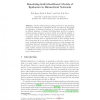Free Online Productivity Tools
i2Speak
i2Symbol
i2OCR
iTex2Img
iWeb2Print
iWeb2Shot
i2Type
iPdf2Split
iPdf2Merge
i2Bopomofo
i2Arabic
i2Style
i2Image
i2PDF
iLatex2Rtf
Sci2ools
111
click to vote
ICCS
2009
Springer
2009
Springer
Simulating Individual-Based Models of Epidemics in Hierarchical Networks
Current mathematical modeling methods for the spreading of infectious diseases are too simplified and do not scale well. We present the Simulator of Epidemic Evolution in Complex Networks (SEECN), an efficient simulator of detailed individual-based models by parameterizing separate dynamics operators, which are iteratively applied to the contact network. We reduce the network generator’s computational complexity, improve cache efficiency and parallelize the simulator. To evaluate its running time we experiment with an HIV epidemic model that incorporates up to one million homosexual men in a scale-free network, including hierarchical community structure, social dynamics and multi-stage intranode progression. We find that the running times are feasible, on the order of minutes, and argue that SEECN can be used to study realistic epidemics and its properties experimentally, in contrast to defining and solving ever more complicated mathematical models as is the current practice.
Applied Computing | Current Mathematical Modeling | Detailed Individual-based Models | ICCS 2009 | Separate Dynamics Operators |
Related Content
| Added | 26 May 2010 |
| Updated | 26 May 2010 |
| Type | Conference |
| Year | 2009 |
| Where | ICCS |
| Authors | Rick Quax, David A. Bader, Peter M. A. Sloot |
Comments (0)

